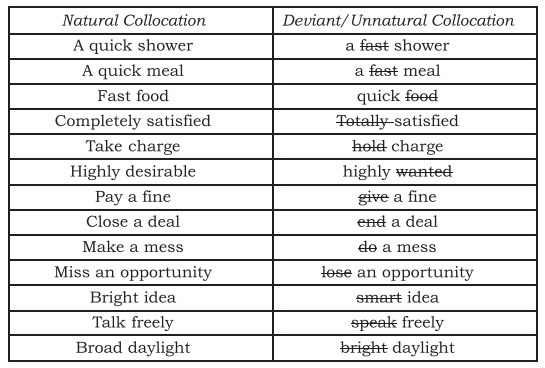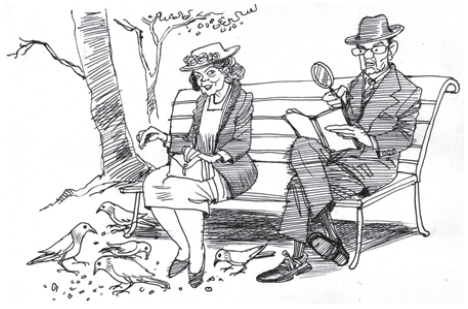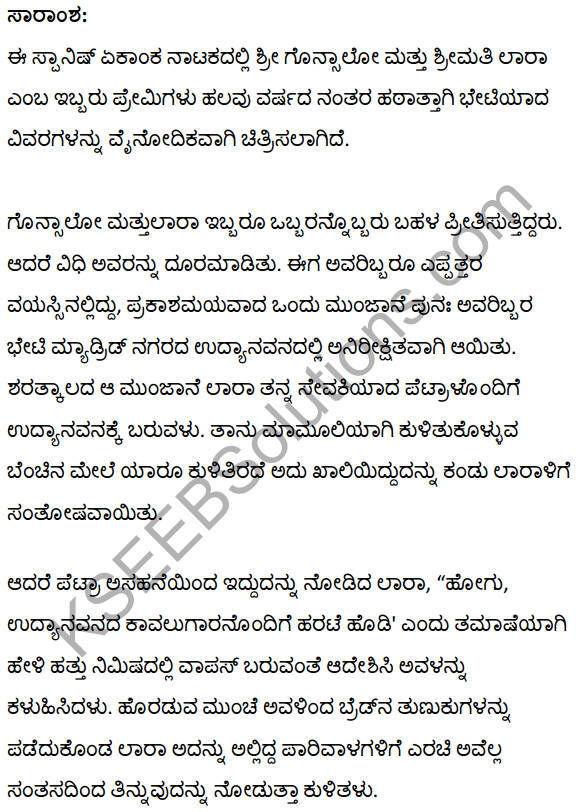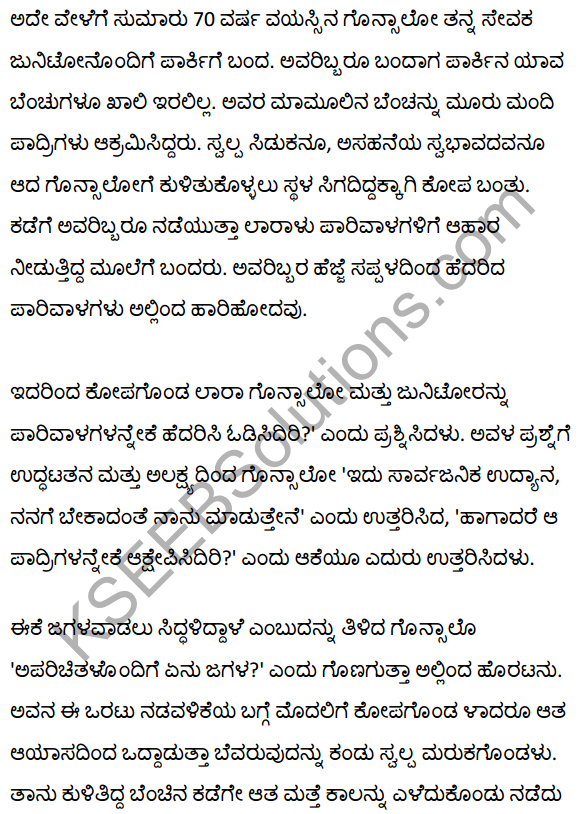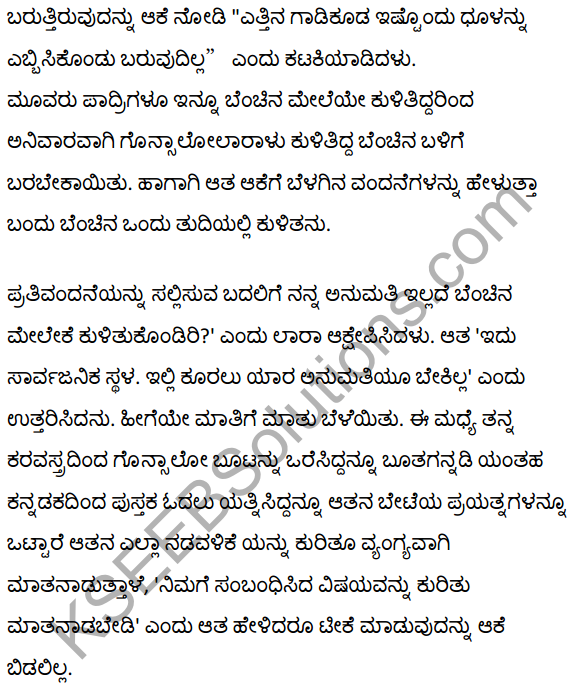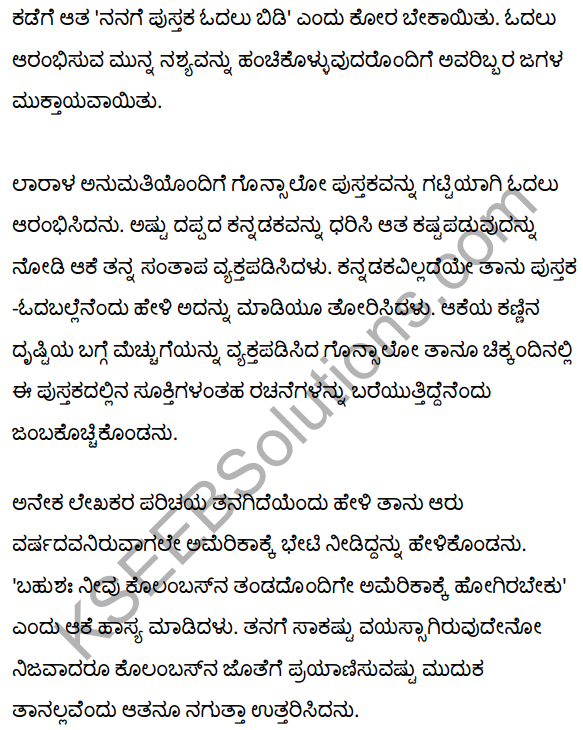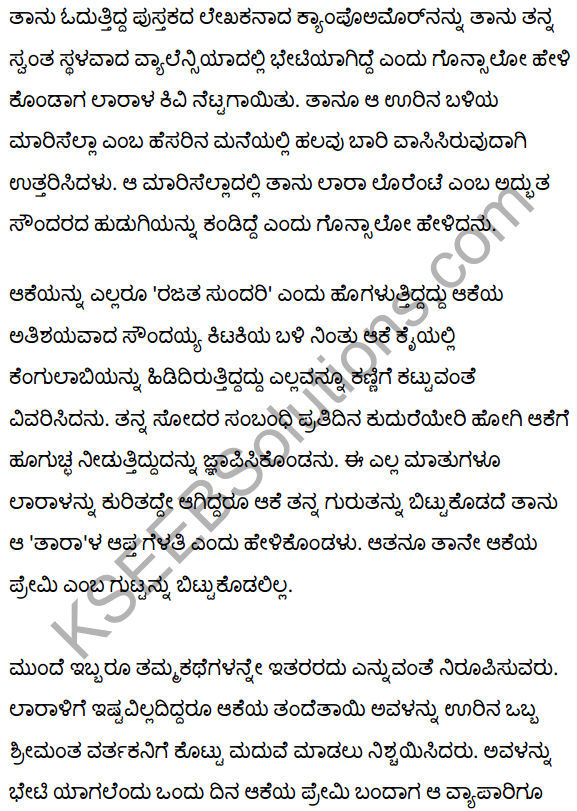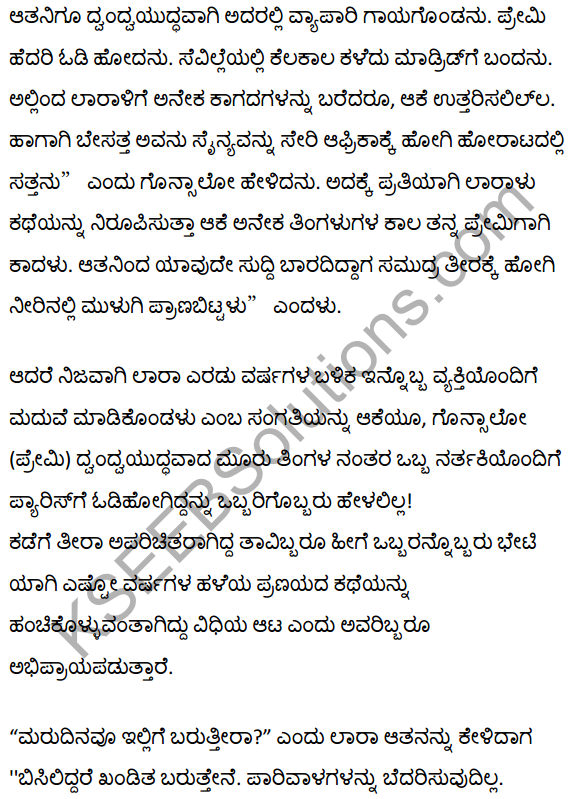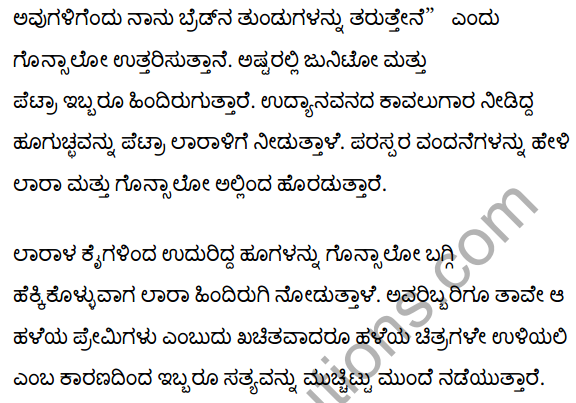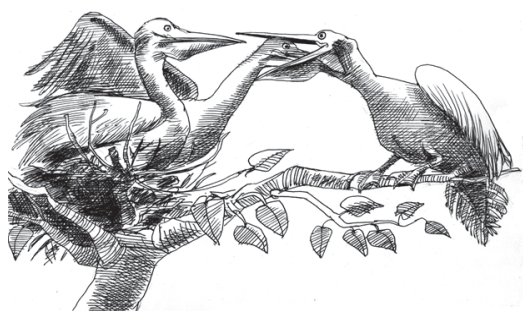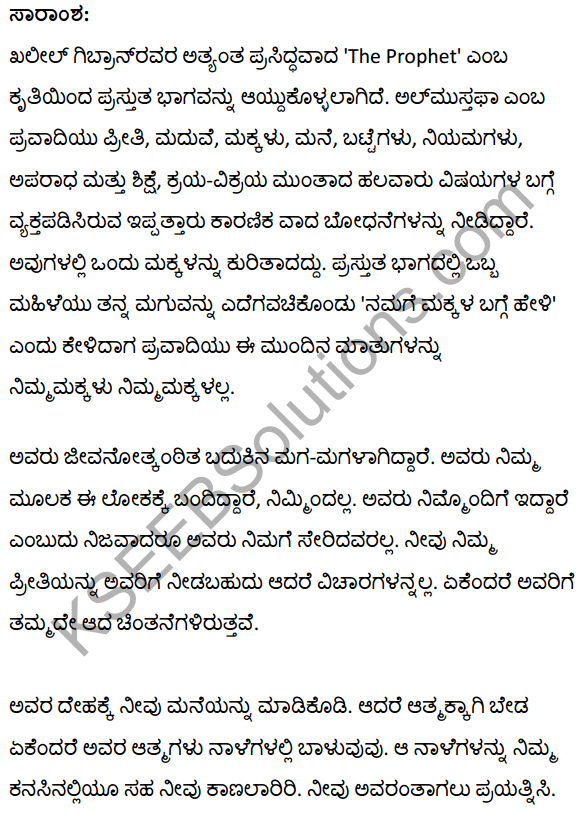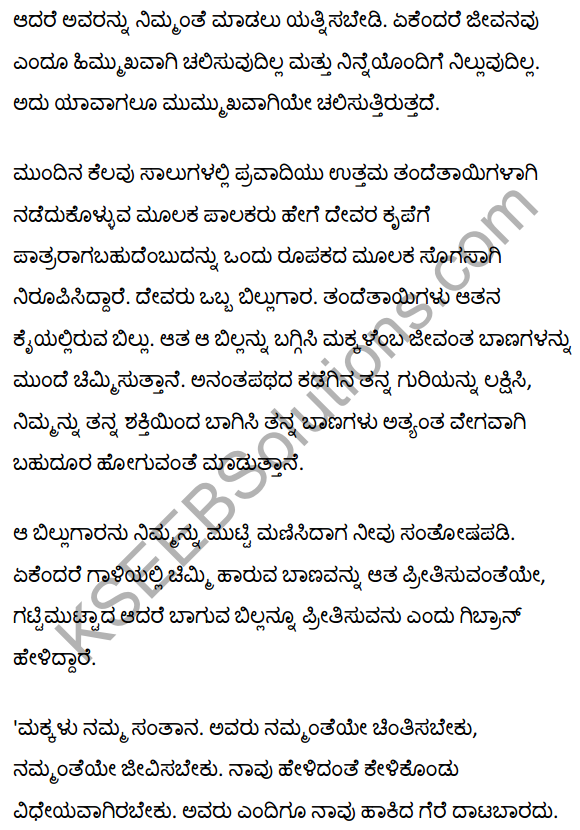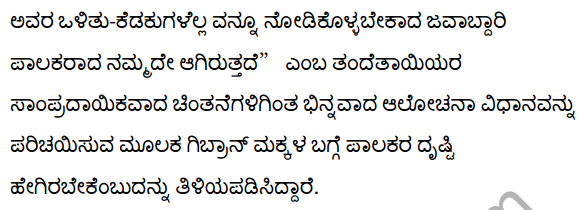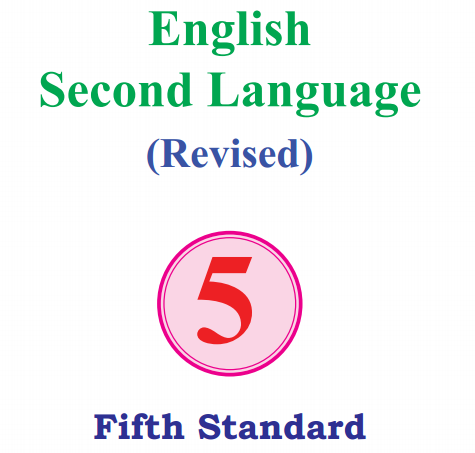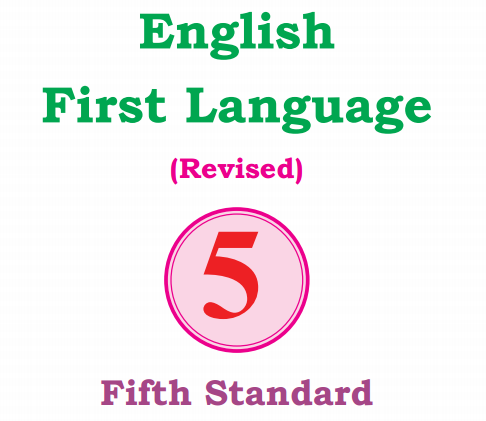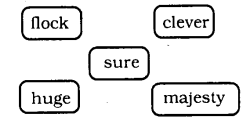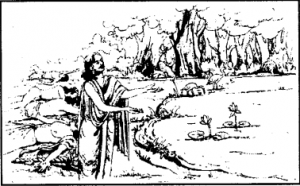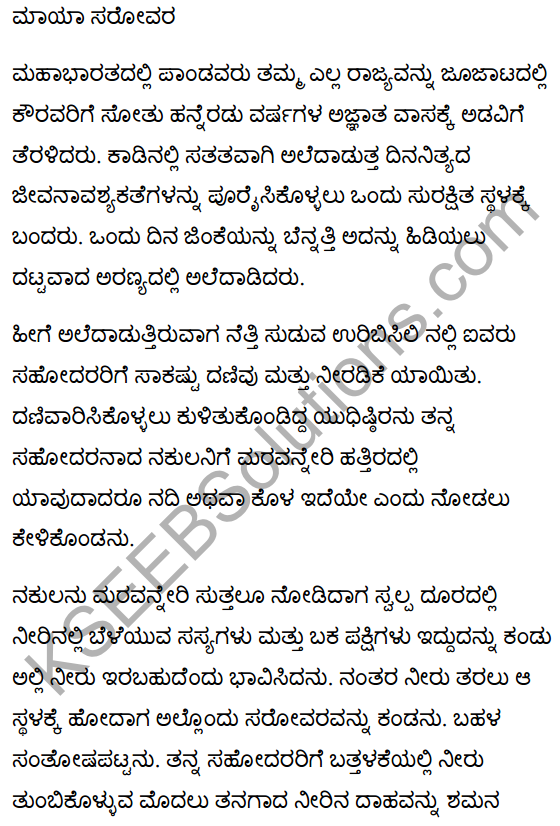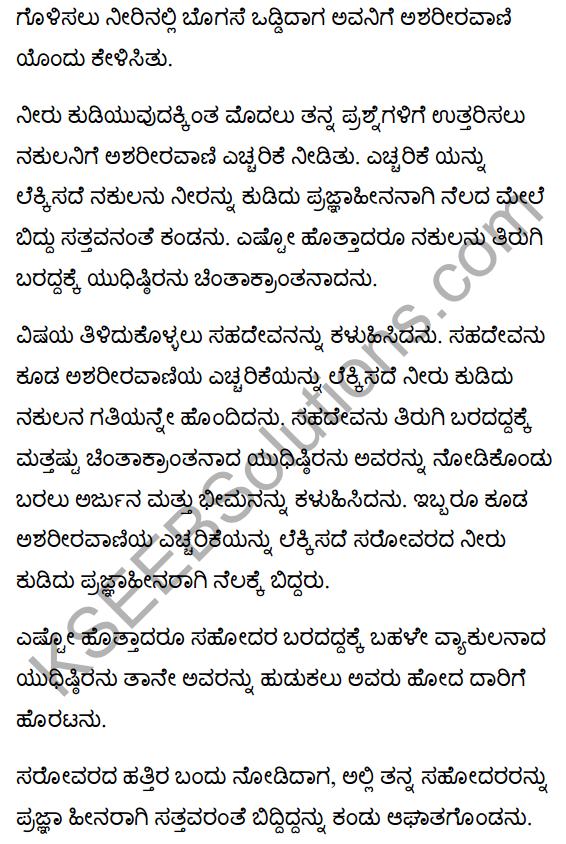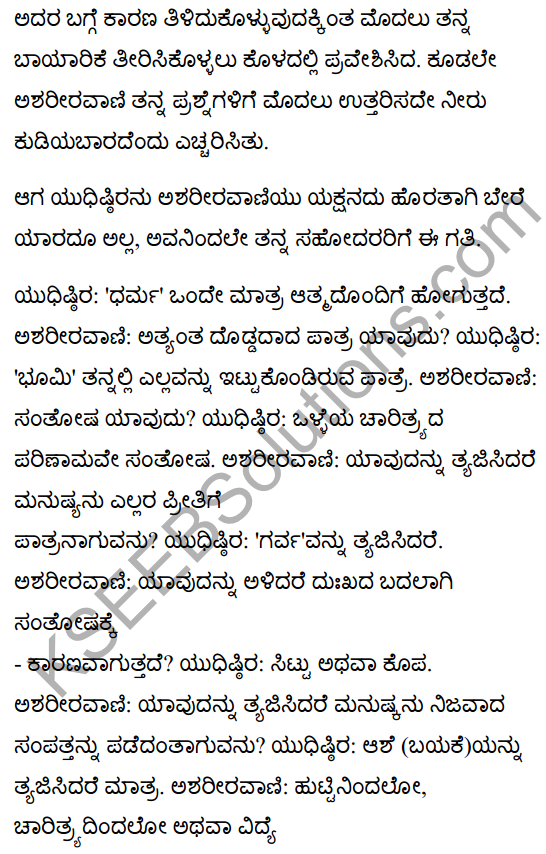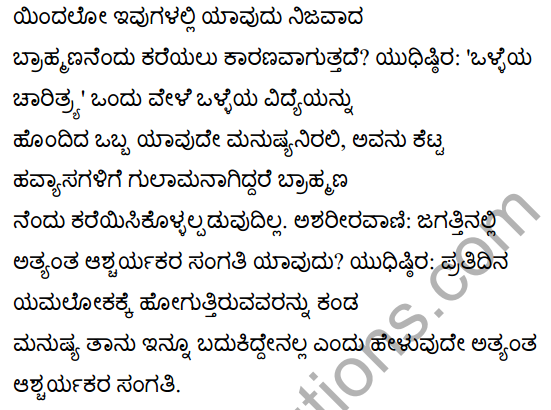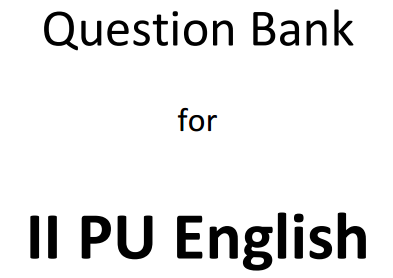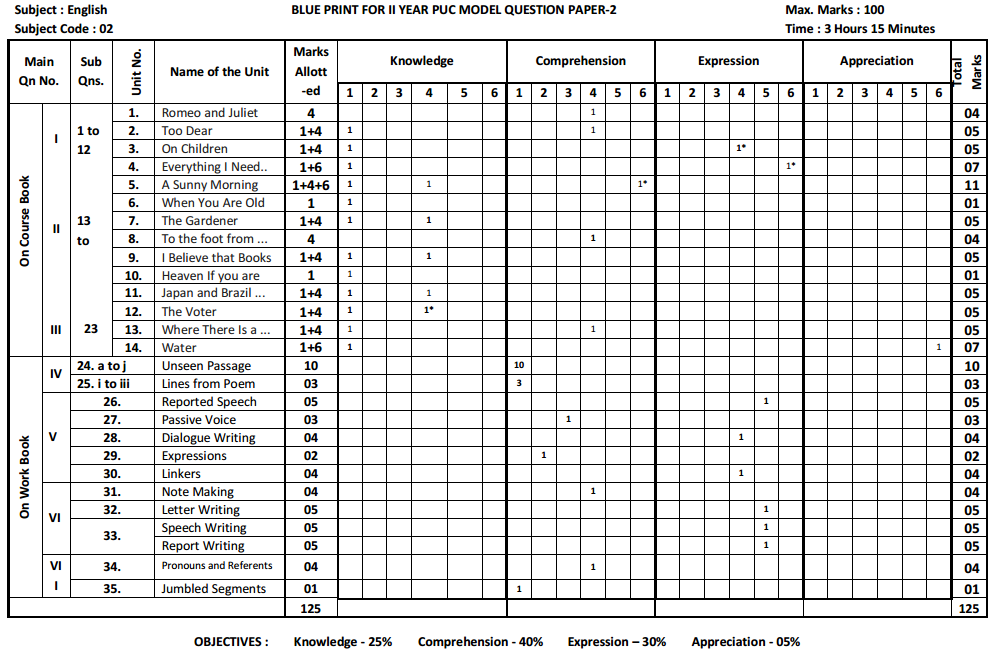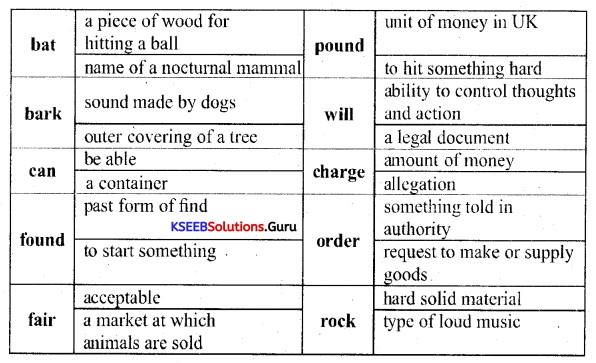Every chapter available in the KSEEB SSLC Class 10 English Solutions subject is explained clearly in an easy way. Learn the depth concept by referring to the Chapterwise There’s a Girl by the Tracks! Questions and Answers Pdf, Notes, Summary Class 10 English Karnataka State Board Solutions. Have a look at every topic and get the complete knowledge on the English subject. Just refer to Karnataka Class 10 English Solutions Prose Chapter 2 There’s a Girl by the Tracks! pdf and have a grip on the total subject.
There’s a Girl by the Tracks! Questions and Answers, Notes, Summary
I believe that the best book is like a best friend to know the complete world by sitting in one place. When you have the best book you have many options to get great knowledge. Selecting the best book will lead to reaching your goal. Students who are looking for the best book to learn English can use Karnataka Board Solutions for Class 10 English Chapter 2 There’s a Girl by the Tracks!. Immediately start your learning with Karnataka Board Class 10 English Solutions Pdf.
KSEEB Solutions For Class 10 English Question 1.
“It’s a regular scene”. What was regular about the scene? (Para -1)
Answer:
In a most populated metropolis like Mumbai the commuters (one who travels to the workplace daily) were more. Evening times they are hurried to go back home, so they rushed to board the trains. If they missed the particular train, they are in trouble and get late to reach their home. So it is a regular scene for those people. No one has time to think about others.
There’s A Girl By The Tracks KSEEB Solutions Question 2.
“Roma Talrej a tried to settle into a corner near the door in the train”, was she right in doing this? What would you have done, if you were there?
Answer:
No, it’s always better to avoid standing near the door. If I were in her place, the first thing I would try to do would be to move into the compartment, away from the door. However, it’s easier said than done. The trains are so jam-packed that movement is almost impossible and quite often we expose ourselves to grave danger.
There’s A Girl By The Tracks Notes KSEEB Solutions Question 3.
“There’s a girl by the tracks”, the voices cried out.
Answer:
The voices came from the passengers who stood at the door Of the train which was coming from the opposite direction.
There’s A Girl By The Tracks English Notes KSEEB Solutions Question 4.
Baleshwar was impulsive in taking a decision because “there is a girl by tracks!”
(Fill in the blank appropriately), (para-3)
KSEEB Solutions For Class 10th English There’s A Girl By The Track Question 5.
The dictionary says ‘callous’ means ‘unconcerned’. In this situation, who do you think was ‘callous’ towards the accident?
Answer:
The people who saw the scene that Roma had Men on the tracks. Though they had seen, they did not volunteer to help her. They were considered as callous towards the accident.
There’s Girl By The Tracks Question Answer KSEEB Solutions Question 6.
‘Baleshwar rushed to help the girl”. His movement has been described with verbs like ‘shoved’. Identify two more such verbs/ verbal phrases in paragraph (5).
Answer:
The two more verbal phrases are
1) Jumped off and
2) landed on
Share your Responses
There Is A Girl By The Tracks KSEEB Solutions Question 1.
Where did Baleshwar find Roma at last?
Answer:
At last Baleshwar found Roma by the side of the tracks between the two stations approximately five kilometers apart.
There’s A Girl By The Tracks Question And Answers KSEEB Solutions Question 2.
“Behenji, aap teek hai ?” But there was no response and no help in sight. Why was it so? Read paragraph 6 and answer.
Answer:
Roma had fallen by the railway track while commuting by an electric train and Baleshwar also had jumped off a still-moving train after pulling the chain. Both the trains had moved on with the rest of the passengers as if nothing untoward had happened. Since it was the railway tracks somewhere between two stations which were five kilometers apart in Thane district, there weren’t people around and there was no help in sight. Roma couldn’t answer the question as she had blacked out after the fall because of a gash in the head.
10th English There’s A Girl By The Tracks Notes KSEEB Solutions Question 3.
Fill in the table with appropriate details.
Answer:
| Name | Age | Education | State they belong to | Profession | Reasons for boarding the train |
| Roma | 21 years | Graduate | Maharastra | Working in call centre | back to home |
| Baleshwar Mishra | 20 years | High School drop out | Uttar Pradesh (U.P) | Un employed | back to home |
Share your Responses :
There’s A Girl By The Tracks Lesson Pdf KSEEB Solutions Question 1.
Who volunteered to help Baleshwar?
Answer:
The middle-aged tempo-truck driver who spoke Gujarati volunteered to help Baleshwar.
There’s A Girl By The Tracks Pdf KSEEB Solutions Question 2.
“Roma stirred and her eyes fluttered open”. What could have made her react so?
Answer:
Roma was shifted to back of the tempo truck with Baleshwar, she lay on the seat. When the vehicle moved unsteadily it made her stir and her eyes fluttered open.
There’s A Girl By The Tracks Summary KSEEB Solutions Question 3.
Some details of Roma’s brother are given in Paragraph 14. Read and fill in the columns appropriately.
Answer:
| Name | Job | Place | Vehicle |
| Dinesh Talreja | Marketing job | Ulhasnagr | motorcycle |
Share your Responses:
The Girl By The Tracks Notes KSEEB Solutions Question 1.
“Oh, I couldn’t thank him”, Balesh-war thought. Who do you think he couldn’t thank ?
Answer:
Baleshwar couldn’t thank the tempo truck driver because he was busy to admit Roma to the hospital and spoke with Dr. Anil Agarwal.
There’s A Girl By The Tracks Questions And Answers Question 2.
Why did Baleshwar revisit the spot where Roma had fallen?
Answer:
Baleshwar revisited the spot to find out Roma’s belongings. Dinesh told him that her mobile phone and handbag were missing.
There’s A Girl By The Tracks Question Answers KSEEB Solutions Question 3.
Baleshwar got some assurance from a railway employee.
Answer:
When he was looking for her belongings at the spot, where Roma had fallen a railway employee assured that Roma’s belongings had been found already found.
There’s A Girl By The Tracks Summary In Kannada KSEEB Solutions Question 4.
Roma said, “I think it’s astonishing”. What was astonishing?
Answer:
The manner in which she had been rescued was astonishing. According to Roma, it was astonishing because a stranger would jump off a train and risk his life for her. She was also a stranger to him.
Think About The Text
There Is A Girl By The Tracks Notes KSEEB Solutions Question 1.
Some incidents relating to Roma Talreja are given below. Put them in the right order.
a. Roma lost her foothold.
b. The train hurtled ahead.
c. Roma was thrown out of the coach
d. Roma was jumped, between two women.
e. Roma panicked.
Ans :
b
d
a
e
c
There’s A Girl By The Tracks Lesson Question And Answers KSEEB Solutions Question 2.
Baleshwar jumped into action to save the girl. His actions in doing so are given in a jumbled manner. Set them in the right sequence, as in the text.
a. Baleshwar crossed the track
b. He carried the girl.
c. He saw the girl bleeding
d. He requested motorists to help him
e. He prayed silently.
Ans:
c
e
b
a
d
KSEEB Solutions For Class 10 English Second Language KSEEB Solutions Question 3.
Write briefly about the personal details such as qualification and profession of Roma Talreja and Baleshwar Mishra after discussion with your classmates.
Answer:
Roma Talreja is 21 years old, B.Com., graduate from Pune. She is working as a call centre executive for two years. She loved her job, talking and connecting to customers and making new friends. She is feeling happy and active. Baleshwar Mishra is 21 years old, high school drops out. He is tall and thin youngster from Mirzapur, UP, he is unemployed recently came to Mumbai. In Mumbai, he is living with his two elder brothers and hunting a job, but his effort is not fruitful.
There’s A Girl By The Tracks 10th Standard English Notes KSEEB Solutions Question 4.
“Take the girl to Airoli”, suggested the cop. But Baleshwar disagreed. Why did he do so?
Answer:
Airoli was at least 10 kilometers away and Baleshwar knew of a small hospital at a closer place. Moreover, Roma, who was bleeding, was unconscious and Baleshwar must have considered each minute crucial. So he disagreed with the suggestion given by the cop.
Question 5.
Some incidents mentioned in paragraph 12 are given in a jumbled order below. Ar¬range them sequentially,
a. The on-duty physician advised Baleshwar to take Roma to a nearby hospital.
b. Baleshwar and Roma Telreja arrived at a small hospital.
c. The nurses in the hospital helped Baleshwar to take the young woman in.
d. The hospital lacked the facility and personnel to treat Roma.
Answer:
b
c
d
a
Question 6.
Was Baleshwar right in asking Roma her name while she lay in a critical condition? Justify your answer.
Answer:
Yes, he had to know who she was so that he could inform her near ones. He had done his best. But there were other things which only family members could decide on. So it was imperative that Baleshwar make Roma talk to get the required piece of information.
Question 7.
“Baleshwar had a good memory”. Do you agree with this ? Give examples to support your view.
Answer:
Yes, I agree with this, when Baleshwar asked her whom should he inform, for that Roma said her brother Dinesh and his phone number. There is no time to write, he memorized that number and called him. This incident shows that Baleshwar had a good memory.
Question 8.
The doctor at the Divine Multi-Speciality hospital admitted Roma without any formalities. What made him do so ?
Answer:
On seeing the head injury, the doctor must have decided that the girl needed immediate attention. Though the injury turned out to be less serious than what it was feared to be, there was no way for the doctor to know that before an examination. Moreover, irrespective of the extent of the injury, the fact remained that Roma had been bleeding for quite some time. So the doctor, who did not stand on formalities, but cared for human beings, admitted Roma without any formalities so that immediate treatment could be given. If we have more doctors like the doctor at the Divine Multi-Speciality Hospital, many lives can be saved.
Question 9.
If Baleshwar had not come forward to help Roma, what would have happened to her?
Answer:
There are many possibilities. The worst possibility is that Roma could have bled to death even though the head injury was not severe, with no one either spotting Roma or everyone being indifferent to Roma. A more optimistic viewpoint at the possibility of another passer-by helping Roma and Roma being saved by the kind gesture of that passer-by. However, there is also the possibility of Roma being handicapped or paralyzed for life, even if she were to get help because of the time lapse between the accident and the time of treatment.
Question 10.
How did the truck driver help Baleshwar?
Answer:
The truck driver was also a selfless, kind-hearted man. He helped Baleshwar in taking Roma to a nearby hospital. When it was known that Roma had to be taken toa bigger hospital, he continued to help Baleshwar. He lent Baleshwar his cell phone so that Roma’s people could be informed. After there was no more need of his help, he quietly moved away without waiting for words of gratitude or appreciation. It’s people like Baleshwar and the driver who make us believe in the goodness of human beings.
Question 11.
Baleshwar felt that the people of Mumbai were afraid. What were they afraid of, according to his opinion?
Answer:
People of Mumbai were afraid of getting involved. They were afraid that if they helped accident victims, they would get trapped in the courts or with the police.
Question 12.
The Dalai Lama says, “Love and Compassion are the true religions to me. But to develop this, we do not need to believe in any religion”. Does this relate to the lesson “There is a Girl by the Tracks”? How? Discuss it with your friends.
Answer:
Yes, Dalai Lama’s sayings are related to this lesson. Here Baleshwar didn’t know the religion of Roma when he decided to help her. Really to love and show concern to the people do not depend on religion. Here Baleshwar had real love, compassion, and concern about human beings. This is the true religion. In this aspect, it relates to Dalai Lama’s sayings.
Enrich Your Vocabulary:
Task -1: Verbs related to different actions are given below. Pick them and put them in their respective columns. Note that some words may fit into more than, one column. Refer to a dictionary if necessary.
tell, grab, pray, squeeze, glance, hurtle, observe, chat, snatch, plead, peep, utter, had, beg, shove, talk, clutch, implore, rush, stare, hold, appeal, dash, gaze, articulate, run
|
Words related to |
||||
| Observing | Moving | Holding | Speaking | Requesting |
| 1. observe | 1. hurtle | 1.squeeze | 1. tell | 1. pray |
| 2. stare | 2. rush | 2. snatch | 2. chat | 2. plead |
| 3. glance | 3.shove | 3. hold | 3. talk | 3. implore |
| 4- gaze | 4. dash | 4. clutch | 4. utter | 4. beg |
| 5. peep | 5. run | 5. had | 5. articulate | 5. appeal |
| 6. grab | ||||
Task – 2: Use the above words meaningfully to fill in the blanks in the following sen fences. You can change the form of the word if required. One example is given.
Question 1.
Five of us ______ ourselves into the back seats.
Answer:
squeezed
Question 2.
English people love to _______ about the weather.
Answer:
talk
Question 3.
Arun ______ Shaila closely and wiped away her tears
Answer:
held
Question 4.
I haven’t _______ to Steve about all this.
Answer:
talked
Question 5.
All club members have been _______ to attend the annual meeting.
Answer:
appealed
Question 6.
Sudha ______ over her shoulder.
Answer:
stared
Question 7.
The thief has _____ away her purse and ran.
Answer:
snatched
Question 8.
Would you mind going to ______ the kids from school?
Answer:
bring
Question 9.
Veena ______ at me in disbelief.
Answer:
gazed
Question 10.
Many people are unable to______ the unhappiness they feel.
Answer:
utter
Task – 3: A paragraph is given below based on the text. Some words are underlined. Substitute these words with the phrases and idioms making use of the clues given in brackets with necessary changes or additions.
Baleshwar Mishra was a bold young man. Even when his life was at risk (face-to-face _____ death), he never had a second thought. Rather he determined (make____ mind) to save the life of the girl. He was doing all he could, while others stood watching him silently (tongue tie). None supported (back up) except a tempo truck driver. After a while, he carried the girl to a hospital and forced (arm twist) the duty doctor to admit the girl. What can we make out from this incident? Some people like Baleshwar remain undisturbed (keep cool) in moments of crisis.
Baleshwar Mishra was a bold young man. Even when he was face – to – face with death, he never had a second thought. Rather he made up his mind to save the life of the girl. He was doing all he could, while others stood watching him tongue-tied. None backed him up except a tempo truck driver. After a while, he carried the girl to a hospital and arm-twisted the duty doctor to admit the girl. What can we make out from this incident? Some people like Baleshwar keep their cool in moments of crisis.
Listen And Comprehend
Task – 1: Listen carefully to the reading of the following passage and take notes by drawing and filling information in the flow – chart. If required, the teacher will read the passage twice.
During my second month of nursing school, our professor gave us a pop quiz. I was a conscientious student and had breezed through the questions until I read the last one: “ What is the first name of the woman who cleans the school?” Surely, this was some kind of joke.
I had seen the cleaning woman several times. She was tall, dark-haired and in her 50s, but how would I know her name? I handed in my paper, leaving the last question blank. Just before the class ended, one student asked if the last question would count toward our quiz grade.
“Absolutely, ” said the professor. ”In your careers, you will meet many people. All are significant. They deserve your attention and care, even if all you do is smile and say ‘hello’.
I’ve never forgotten that lesson. I also learned her name was Dimple.
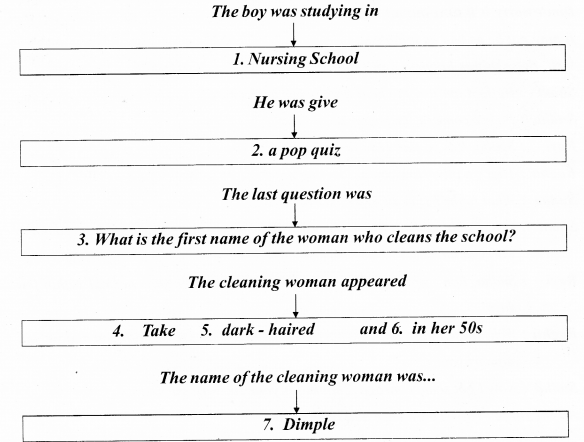
Listen And Comprehend
Task – 1: Listen carefully to the reading of the following passage and take notes by draw¬ing and filling information in the flow – chart. If required, the teacher will read the passage twice.
During my second month of nursing school, our professor gave us a pop quiz. I was a conscientious student and had breezed through the questions until I read the last one: “ What is the first name of the woman who cleans the school?” Surely, this was some kind of joke.
I had seen the cleaning woman several times. She was tall, dark-haired and in her 50s, but how would I know her name? I handed in my paper, leaving the last question blank. Just before the class ended, one student asked if the last question would count toward our quiz grade.
“Absolutely, ” said the professor. ”In your careers, you will meet many people. All are significant. They deserve your attention and care, even if all you do is smile and say ‘hello’.
I’ve never forgotten that lesson. I also learned her name was Dimple.
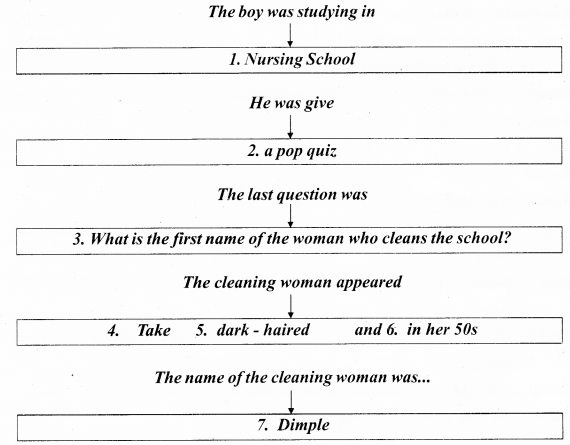
Task – 2: Imagine something bad has happened in your friend’s life. You meet him/her. You need to sympathize with and instill confidence in him/her. Write a dialogue.
Note: The following expressions are used to convey sympathy.
I’m sorry to hear about…..
That’s so sad…..
I’m awfully /dreadfully sorry about…
That’s a pity / hard luck /1 know how it feels…….
How upsetting/annoying/oh, how dreadful/terrible/awful…
You must be very upset…….
I’m extremely sorry to hear that/Im/ was deeply sorry to hear/learn about…
Bad luck……
Can I help you in any way….?
Don’t worry it’ll turn out all right…
It may not be as bad as it looks…
Well, these things happen, don’t they….?
Sham: Hello, I am sorry to hear about your accident.
Sudha: Please come in, take your seat.
Ravi: Sudha, It is so sad, How did it happen?
Raghu: That’s a pity, How you are feeling now?
Sudha: What to do? It is all of my bad luck.
Sham: O.K. Could we help you in any way? We will give our notes to study, need not to worry at all.
Ravi: Sudha, don’t worry, it’ll turn out all right, you’ll become normal within few days.
Raghu: Well, these things are common, have courage, we are all with you and we will support you.
Sudha: Now I got some courage. Thanks for your, support, guys.
All the three: Have confidence and recover soon.
Read And Respond
Task – 1: Look at the picture – 1 in column ‘A’. Some statements are made in column ‘B’ about the actions as seen in ‘A’. Some of the statements are wrong, and some of them are right if they are wrong, correct them. If they are a right to mark (✓)
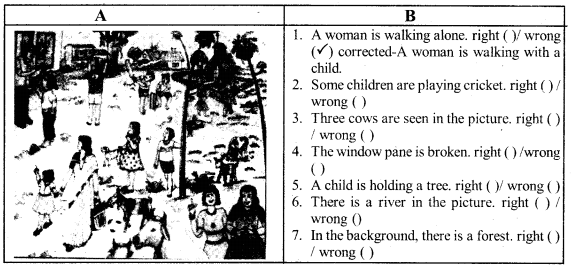
1. A woman is walking with a child, [corrected]
2 Some children are playing cricket, [right ✓]
3. [wrong ✓]Two cows are seen in the picture.
4. The window pane is broken [right ✓]
5. A child is holding a tree [ wrong ✓] A boy is holding a tree [corrected]
6. [wrong ✓] There is no river in the picture. [corrected]
7. [wrong✓] In the background, there is a town [corrected]
Task – 2: Look at the picture-2. Try to describe what you can see in the picture. Some clues are given. One is done for you.
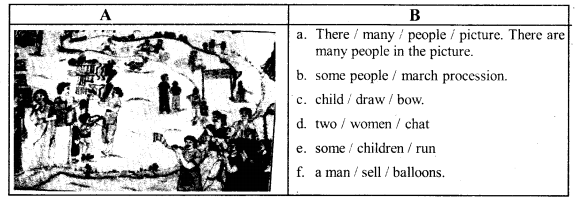
a. There are many people in the picture.
b. Some people are marching in the procession,
c. A child is drawing the bow.
d. Two women are chatting
e. Some children are running.
f. A man is selling the balloons.
Practice Writing
Task -2: Work in pairs and write a letter to the editor, focussing on the problems of your locality.
S. Ramachandra
No. 536, III Cross,
Banashankari,
Bengaluru.
2nd February 2014,
The Editor,
Indian Express, M.GRoad, Bangalore – 560001.
Dear sir,
Sub: Broken pipeline
In our road the water pipe has broken and we didn’t get the supply of water since Monday. The complaint was given already to B.W.S.S.B. But no one is responding. The whole locality is suffering. The concerned authorities should take steps to necessary action. We hope the best reaction from your side.
Thank you,
Yours faithfully,
S. Ramachandra
Task -3:
Prepare a questionnaire.
Imagine you are a correspondent of an English daily and you have to interview the following persons on the issue ‘Safety measures taken with regard to traffic and the public response ‘.
I. Superintendent of Police
1. Good morning Sir/Madam. I am Abhilash I’m a reporter from an English Daily.
2. Sir/Madam, I’ve some questions. Could you spare some time for me, please?
3. We heard so many safety measures are taken recently, May I know about these?
4. The riders of the two-wheelers violate the safety rules. What do you say about?
5. The teen-agers driving is very rash. Do you agree this? How to control this?
6. Sir/Madam, what do you suggest to the parents and the public?
7. Nowadays the number of vehicles are increasing rapidly. It causes air and noise pollution. How do you think we can prevent pollution?
8. Sir/ Madam, what advice would you like to give to avoid accidents.
9. Sir/Madam, on behalf of our media I’m highly thankful to you.
II. Traffic Inspector
1. Good morning Sir/ Madam, I am Bharath. I’m a reporter from an English Daily.
2. Sir/Madam, I ’ve some questions. Could you spare some time for me, please?
3. Nowadays the traffic is too heavy and traffic jams are regular. May I know what measures have been taken in this regard?
4. During peak hours, traffic jams are not clear quickly. What do you suggest to the public about this?
5. During peak hours the accidents are more. How to avoid accidents and traffic jam? What is your advice?
6. Though the safety measures are taken, we cannot control the traffic. What do you say?
7. How the public will respond? Please give your comments.
8. Sir/ Madam, on behalf of our media, I’m highly thankful to you.
III. Local MLA
1. Good morning Sir/Madam, I am Pradeep, I’m a reporter from an English Daily.
2. Sir / Madam, I’ve some questions. Could you spare some time for me, please?
3. Your responsibilities are more. Today I want to know your views on ‘Safety mea¬sures taken with regard to traffic and the public response ’. Your comments please.
4. Sir/Madam, are you satisfied about the measures taken by concerned authority ?
5. Sir/Madam, what are the other methods you suggest about?
6. Sir/Madam, are any complaints from the public about this?
7. Sir/Madam, what advice would you like to give him?
8. Sir / Madam, how do we make our traffic safety? Your comments please.
9. Sir/Madam, on behalf of our media I’m highly thankful to you.
Learn grammar through communication.
Task – 1: Read the following paragraph and carefully observe the words underlined. One word is struck off. Consult your teacher or a grammar book and know the reason.
Everybody Know/knows ‘slow and steady win/wins the race’, somebody try/tries to move slowly but some people want/wants to move at a faster pace. One of the students in my class is/are Jairaj. He is very industrious and energetic. He feels that in India everybody want / Wants to get success, but a few work/works diligently. They opine /opines that ‘ Time and tide wait for Avails for none. So everybody need/needs to work round the clock to make India stronger and better.
Answer:
Everybody knows ‘slow and steady wins the race’, somebody tries to move slowly but some people want to move at a faster pace. One of the students in my class is Jairaj. He is very industrious and energetic. He feels that in India everybody want / Wants to get success, but a few work diligently. They opine that ‘ Time and tide wait for Avails for none. So everybody needs to work round the clock to make India stronger and better
Task – 2 : Choose the correct verb out of the two given in brackets:
- Neither he nor you ___ wrong, (is/are)
- His father and uncle ____ their own business, (has/have)
- The first innings _____ very interesting, (was/were)
- Either Amrutha or her friends ____ taken it. (has / have)
- Every one of the boys ____ sitting silently in the hall, (was/were)
- Every leaf ____ fallen from this tree, (has/have)
- Each of the boys ____ done his homework, (has/have)
- He, as well as you, _____ intelligent, (is/are)
- Bread and butter ____ his daily diet, (were/was)
- Either you or he ____ done it. (has / have)
- One of the boy ____ punished. (was/were)
- Neither the children nor their mothers _____ admitted to hospital, (were/was)
Answer:
- Neither he nor you are wrong, (is/are)
- His father and uncle have their own business, (has/have)
- The first innings was very interesting, (was/were) y
- Either Amrutha or her friends have taken it. (has / have)
- Every one of the boys was sitting silently in the hall, (was/were)
- Every leaf has fallen from this tree, (has/have)
- Each of the boys has done his homework, (has/have)
- He, as well as you, js intelligent, (is/are)
- Bread and butter was his daily diet, (were/was)
- Either you or he has done it. (has / have)
- One of the boys was punished. (was/were)
- Neither the children nor their mothers were admitted to hospital, (were/was)
Task – 3: Read the following paragraph. A blank is given after each number. If the underlined word is correct write (C) in the blank. If the underlined word is wrong, write the right form of the word in the blank.
Everyone who has (1) eg., has ever been to a graduation ceremony know (2) knows how exciting it can be for the graduates. In our town, nearly the whole population comes (3) come each year. There are (4) is one thing that both graduates and guests enjoy (5) c the awarding of scholarships. This ceremony, along with concluding exercises makes (6) make attending the graduation worthwhile. Several of the students who receive (7) received awards plan (81 planned to attend the community college. Many former graduates is (9) are grateful for opportunities that such an award provides (10) provided to them.
Make reference
Study the meanings of a word given in a dictionary.
Compose (verb) composed, composing, transitive verb
1. consist of
2. combine together to form
3. makeup
4. write a piece of music
5. write a letter poem
6. try hard to become calm after feeling very angry, upset or excited.
7. to arrange to parts of a painting, photograph or scene in a way that achieves a particular result..
TASK 1: Some sentences are given below. In each sentence the word ‘compose’ is used. Identify the meaning given above and write the corresponding number in the boxes.
1. Nayana sat at the desk, taking several deep breaths to compose herself (6)
2. Water is composed of hydrogen and oxygen. (1)
3. A.R. Rehman has composed music for the filmKocchadian (4)
4. The legal system is composed of people and people make legal systems. (3)
5. More than 17.6 million firms composed the business sector of our economy. (2)
6. I like the way Ravi composes his photographs (7)
There’s a Girl by the Tracks! Additional Questions and Answers
Multiple Choice Questions
Question 1.
“There’s a Girl by the Tracks !” is the extract which describes
a) Small story
b) a ferrible accident
c) people of Mumbai
d) Metropolis
Answer:
b) a ferrible accident
Question 2.
“There’s a Girl by the Tracks !” is the extract written by
a) Devenkanal
d) Shakespeare
c) William Shakespeare
d) Bernard Howe
Answer:
a) Devenkanal
Question 3.
The accident took place at
a) Bangalore
b) Delhi
c) Mumbai
d) Kolkatta
Answer:
c) Mumbai
Question 4.
The accident happened on
a) Road
b) riverside
c) footpath
d) On the railway track
Answer:
d) On the railway track
Question 5.
Roma was wearing
a) black salwar-kameez
b) frock
c) pant & shirt
d) chudidar
Answer:
a) black salwar-kameez
Question 6.
Roma was working as a
a) teacher .
b) call centre executive (CCE)
c) assistant
d) clerk
Answer:
b) call centre executive (CCE)
Question 7.
Roma was helped by
a) her friend
b) her coleague
c)Baleshwar
d) Co-passenger.
Answer:
c)Baleshwar
Question 8.
The accident had taken place on
a) December 10, 2010
b) December 20, 2011
c) December 25, 2012
d) December 21, 2010
Answer:
a) December 10, 2010
Question 9.
Baleshwar Mishra was
a) an unemployed
b) doctor
e) co-worker
d) graduate
Answer:
a) an unemployed
Question 10.
Roma’s brother was
a) Baleshwar
b) Dinesh
c) Truck driver
d) Vijay.
Answer:
b) Dinesh
Question 11.
Roma’s fiance was
a) Dinesh
b) Agarwal
c) Vijay
d) Baleshwar
Answer:
c) Vijay
Question 12.
The cop suggested to take her to
a) nearby hospital
b) Airoli
c) Mumbai
d) Mirzapur
Answer:
b) Airoli
Question 13.
The person who volunteered to help was
a) Motorist
b) Doctor
c) Cop
d) Tempo Truck driver
Answer:
d) Tempo Truck driver
Question 14.
The tempo truck driver spoke
a) Hindi
b) English
c) Gujarati
d)Marati
Answer:
c) Gujarati
Question 15.
Airoli was atleast ____ kilometers away from there
a) 15
b) 10
c) 20
d) 25
Answer:
b) 10
Question 16.
The cop means
a) helper
b) police
c) pedestrian
d) caretaker
Answer:
b) police
Question 17.
ICU means
a) Indian council unit
b) Intensive care unit
c) Inside call unit
d) Interior course unit
Answer:
b) Intensive care unit
Question 18.
Dinesh Talreja’s retail outlet is in
a) Mumbai
b) Thane
c) Ulhasnagar
d) Bardoli
Answer:
c) Ulhasnagar
Question 19.
The doctor who treated Roma was
a) Duty physician
b) Dr. Vijay
c) Dr. Dinesh
d) Dr. Anil Agarwal
Answer:
d) Dr. Anil Agarwal
Question 20.
Baleshwar had revisited the spot because
a) to investigate
b) looking for her belongings
c) to get assurance
d) to meet someone
Answer:
b) looking for her belongings
Question 21.
The person who assured Baleshwar that some of Roma’s belongings had been found.
a) Ticket collector
b) Pedestrian
c) A railway employee
d) Doctor
Answer:
c) A railway employee
II. Match the Following:
| S.no | A | B |
| 1. | swarm | a) move fast |
| 2. | hurtle | b) low sound |
| 3. | Tenuous | c) worried |
| 4. | Thud | d) weak or shaky |
| 5. | Wary | e) silenced |
| 6. | muffled | f) rush |
Answer:
| S.no | A | B |
| 1. | swarm | f) rush |
| 2. | hurtle | a) move fast |
| 3. | Tenuous | d) weak or shaky |
| 4. | Thud | b) low sound |
| 5. | Wary | c) worried |
| 6. | muffled | e) silenced |
2.
| S.no | A | B |
| 1. | clattering | a) come from |
| 2. | Emnate | b) with no hope |
| 3. | impulsively | c) a deep cut |
| 4. | frantically | d) making a loud sound |
| 5. | gash | e) run very fast |
| 6. | sprint | f) without any thinking |
Answer:
| S.no | A | B |
| 1. | clattering | d) making a loud sound |
| 2. | Emnate | a) come from |
| 3. | impulsively | f) without any thinking |
| 4. | frantically | b) with no hope |
| 5. | gash | c) a deep cut |
| 6. | sprint | e) run very fast |
Answer the following questions in a word or a sentence each:
Question 1.
Which is the metropolis being referred to?
Answer:
Mumbai.
Question 2.
How old was Roma Talreja?
Answer:
Twenty-one.
Question 3.
How old was Baleshwar Mishra?
Answer:
Twenty years old.
Question 4.
Where did Roma Talreja work?
Answer:
Roma Talreja worked at a call centre.
Question 5.
Where was Baleshwar Mishra from?
Answer:
Baleshwar Mishra was from Mirzapur in Uttar Pradesh.
Question 6.
Who helped Baleshwar take Roma to the hospital?
Answer:
A tempo-truck driver who spoke Gujarati.
Question 7.
Why did Baleshwar not take the girl to Airoli?
Answer:
Baleshwar did not take the girl to Airoli as it was at least ten kilometers away and also because he knew of a hospital much closer.
Question 8.
Where was Dinesh employed?
Answer:
Dinesh was in a marketing job at a retail outlet in Ulhasnagar.
Question 9.
Who was the Medical Director of Divine Multi-speciality and Research Centre?
Answer:
Dr. Anil Agarwal.
Question 10.
Why was Roma astonished?
Answer:
Roma was astonished because a complete stranger had risked his life to save her.
Answer the following questions in 2-3 sentences each:
Question 1.
What happened to Baleshwar as he jumped off the still-moving train?
Answer:
When Baleshwar jumped off the still-moving train, he fell and hurt his ankle. The force with which he fell could be surmised from the fact that part of the sole of his rubber slipper was torn off. Fortunately, there was no real damage though a burst of pain shot up his ankle. However, Baleshwar ignored his own pain to go in search of the fallen girl.
Question 2.
What does the phrase ‘treading water’ mean? Who is said to be treading water? Why?
Answer:
The phrase ‘treading water’ is an idiom. Someone who is treading water is not doing anything to make progress. Here Baleshwar is said to be treading water because his job hunt had proved fruitless.
Question 3.
Why did Baleshwar want to thank the truck driver?
Answer:
As Baleshwar stood on the road holding the bleeding girl in his arms, no one helped him take her to the hospital. Just when he had begun to lose hope, a tempo-truck pulled over and, its driver, a middle-aged man who spoke Gujarati, stepped out and helped Baleshwar take her to the hospital. But before Baleshwar could thank him for the noble deed, the man had disappeared, having done his duty.
Question 4.
What did Baleshwar Mishra do as soon as he saw the girl lying by the tracks?
Answer:
On seeing the girl by the tracks, Baleshwar immediately pulled the red emergency chain of the train. As the train slowed, he asked the other passengers to come with him to help the girl. No one came forward. Then Baleshwar bravely jumped off the still-moving train and rushed towards the girl.
Question 5.
How did the doctors at Divine Multi-Specialty Hospital treat Roma?
Answer:
The Medical Director of the hospital saw the extent of Roma’s injuries and immediately admitted her to the ICU without any paperwork. X-rays were taken and the doctors found that she needed surgery. She was taken care of very well and recovered soon.
Question 6.
After Roma’s recovery, what did she say about Baleshwar?
Answer:
Roma was amazed to hear about the manner in which she had been rescued. She wondered how a stranger could jump off a train and risk his life for her. She could not imagine what would have happened to her if Baleshwar had not been there. She felt that she could never repay him for what he had done.
Answer the following questions in 5-6 / 8-10 sentences each:
Question 1.
How did the two hospitals respond to Roma when she was taken there?
Answer:
It’s heartening to see that the hospitals didn’t respond in a disgraceful manner. Sometimes even hospitals are indifferent to accident victims and refuse to help. But, fortunately for Roma, if the first hospital gave her first aid, the bigger hospital offered treatment without standing on formalities. However, one question stands unanswered. Why did Baleshwar have to take Roma in the same truck to the next hospital? Shouldn’t the first hospital have arranged for an ambulance? Luckily Roma survived. But the story could have been different if her injury had been of a more serious nature. That is why it’s necessary that we, as citizens of India, impress upon our government the need to revamp the legal implications of helping an accident victim.
Question 3.
How did Baleshwar save Roma?
Answer:
As soon as Baleshwar saw a girl lying by the side of the tracks, he pulled the chain, jumped off the train, and ran back to where she had fallen. He found her unconscious, with a gash in the head. He carried the bleeding girl across the tracks. But, even after he reached this road, no one stopped to help him. Fortunately, a tempo truck driver helped Baleshwar take the girl, whose name he learn’t was Roma when she regained consciousness for a brief while, to a nearby hospital. On coming to know that the hospital lacked the required equipment and personnel to treat the girl, the truck driver took them to another bigger hospital, the Divine Multi-Speciality Hospital at Ghansoli. The doctor admitted her immediately without standing on formalities and gave her first aid. As the doctor said, although the injury was not of a very serious kind, if no one had bothered to help Roma, she could have bled to death.
Question 5.
According to the Dalai Lama, ‘Love and compassion are the true religions’.
How does this relate to the lesson ‘There’s a Girl by the Tracks!’?
OR
The Dalai Lama says, “Love and compassion are the true religions to me. But to develop this, we do not need to believe in any religion.”
How can this be related to the lesson ‘There’s a Girl by the Tracks!’? Justify.
Answer:
By caring for a total stranger Baleshwar shows that his religion is of love and compassion. When all the other passengers remained inactive, Baleshwar jumped out of the moving train so as to reach the girl by the tracks before it was too late to help her. In spite of being an uneducated and unemployed youth, Baleshwar showed more refinement than all the others in the train. He hurt himself and went through a lot of hardship as he carried the girl across the tracks and ran looking for help. After many motorists had driven away showing no concern for the grievously injured girl, a tempo-truck driver showed the same nobility as Baleshwar and helped him get medical help for the girl. Thus we see that two gentlemen who save the life of a girl show that there is still goodness in humanity.
Read the following extracts and answer the questions given below them:
Question 1.
“Now he was treading water, and had resigned himself to the fact that he was running out of options.”
a) What does the phrase ‘treading water’ mean?
b) Who is referred to here?
c) Why is he said to be ‘treading water’?
Answer:
a) Someone who is treading water is not doing anything to make progress.
b) Baleshwar.
c) He is said to be treading water because his job hunt had proved fruitless. He was a high school dropout and in the present time when well-educated people find it hard to find a job, it was next to impossible for Baleshwar to find one.
Question 2.
Let’s go and help her.
a) Who made this cry?
b) Why did she need help?
c) Nobody volunteered to help her. Why?
Answer:
a) Baleshwar.
b) She had lost her balance and fallen off the train. She was lying unconscious by the tracks.
c) According to Baleshwar, people are afraid of getting involved, in getting trapped in the courts or with the police.
Question 3.
Please help me take her to a hospital.
a) Who requested for help? OR Who is the speaker? OR Who does ‘me’ refer to?
b) Whom did the speaker request for help?
c) Why did the speaker want help?
Answer:
a) Baleshwar.
b) He requested the motorists who drove by.
c) Baleshwar wanted to take the girl who had fallen off the train and was lying unconscious by the tracks, to the hospital.
Question 4.
They fear getting trapped in the courts or with the police.
a) Who said so?
b) Who is ‘they’?
c) What do they fear?
Answer:
a) Baleshwar Mishra.
b) ‘They’ refers to the people.
c) The people fear because they may have to go to the court or police station several times to give witness.
Question 5.
“Chacha, can I borrow your mobile?”
a) Who is referred to as chacha?
b) Who is the speaker?
c) Who did he want to speak to?
d) Why did he want the mobile? OR What did the speaker want to tell him?
Answer:
a) The truck driver.
b) Baleshwar.
c) Roma’s brother, Dinesh.
d) He wanted to inform Dinesh about the accident. So he asked the truck driver for his mobile.
Question 6.
“There’s a closer place I know of,”
a) Who is the speaker?
b) Why did he choose that place?
c) What happened after going to that place?
Answer:
a) Baleshwar Mishra.
b) The cop suggested that Baleshwar take Roma to Airoli which was at least 10 kilometers away. Roma was bleeding profusely and had to be given immediate medical help. So Baleshwar decided to take her to a place which was closer.
c) The hospital lacked the facility and personnel to treat Roma. The on-duty physician advised Baleshwar to take Roma to a nearby hospital.
Question 7.
“Whom can I call?” he asked quickly, fearing that she would black out once more.
a) Who does ‘V refer to?
b) What did the listener answer?
c) What do you mean by ‘blackout’ here?
Answer:
a) Baleshwar.
b) Dinesh Talreja.
e) Become unconscious.
Question 8.
“Take the girl to Airoli” suggested the cop. “There’s a hospital there”.
a) Who was to be taken to Airoli?
b) Why did he suggest so?
c) Why did Baleshwar not agree to this?
Answer:
a) Roma Talreja.
b) Because Roma was bleeding profusely.
c) The cop suggested that Baleshwar take Roma to Airoli which was at least 10 kilometers away. Roma was bleeding profusely and had to be given immediate medical help. So Baleshwar decided to take her to a place which was closer.
Question 9.
“Whom can I call?” he asked quickly.
a) Who asked this question?
b) Why did he ask quickly?
c) What was the reply?
Answer:
a) Baleshwar Mishra.
b) Because he feared she (Roma) would blackout or become unconscious again.
c) She replied, ‘My brother Dinesh’.
There’s a Girl by the Tracks! Summary in English
‘ There’s a Girl by the Tracks ! ” is the extract taken from an English Journal. This is written by a well-known writer Deven Kanal in English. This is one of the terrible accidents which W happened at Mumbai suburban station in Thane district, which borders Mumbai. One evening at 6.32 pm an electric train halts at a station. As usual the station is full ofpeople and everybody hurried to catch the train. At Mumbai this is the regular scene because it is India s most populated Metropolitan city. Roma Talreja a 21 years old call centre executive tried to settle into a corner near the door of an electric train As it was very rush and already the train was already moving fast, Roma jammed between other women.
She tried to find some space to stand safely but all of a sudden she got pushed, she was not able to manage herself to standfirmly. Her weak and shaky foot lost their grip and her hands tried to hold the steel railing above, but finding only air she was thrown out of the coach. She fell on the ground more than a meter below. She was knocked senseless. The low sound of her fall was silenced by the loud sound of the train. No one observed her fall. Another train was coming in the opposite direction passed beside this train.
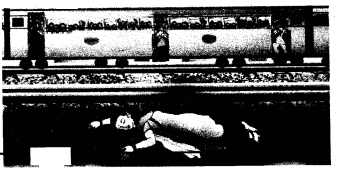
Baleshwar Mishra, twenty years old standing near the door couldn’t believe his eyes. He saw the fall of Roma fall. Wearing a black Salwar- Kameez, her body was lying next to the tracks. Those who saw this scene screamed and the people cried out “There’s a Girl by the Tracks!”. Quickly Baleshwar went and grabbed the train s red emergency chdin and pulled it down with no hope. But luckily the train slowing down its speed comes to a stop. He saw the worried faces of the people surrounded and asked them to come and help her. But nobody came forward to help her. Baleshwarjumped off from the moving train. As he landed on the ground, a burst of pain shot up in his ankle, but there was no damage. His old rubber slipper s sole tom off as a result of his jumping from the train. When he got down from the train, the train again started to move and disappeared.
Baleshwar started to run very fast between the tracks to find Roma. He was so far away from her. That he couldn’t see her. After running for several minutes he found her lying stretched by the side of the tracks. When he found her, he asked “Behenji, aap theek hai ? ” But there was no response and no help in sight. He could see bloodflowing out of a deep cut behind her head. Saying a silent prayer, he carried her and searchingfor a way out. He crossed through some shrubbery, and reached the road. He was seeking help from motorists but no one stopped. The day was December 10, 2010, a Friday. Roma Talreja a B.Com., graduate from Pune was working in call center as an executive for two years.
She loved her job. After her day’s duty she went to cafeteria, where she and her friends joked, laughed and made plans for the weekend. When she was returning home the accident happened. Baleshwar Mishra a lanky youngster from Mirzapur, UP, was unemployed. He had recently come to Mumbai. He is an highschool dropout, living with his two elder brothers. He was hunting for a job till that day it is not fruitful. So, he had lost his hope. That day he spent his time, had lunch and watched a movie with his friend. When he was returning home, thinking about his future he boarded the train. The terrible accident happened, at that moment he could only think of saving a stranger s life.
Baleshwar was struggling very hard to hold the blood-stained woman in his arms. Though innumerable motorists drove by, no one came forward to help him. Atlast a tempo-truck stopped. Baleshwar begged earnestly to help him, he agreed and helped. Baleshwar was quickly telling the driver what had happened. The traffic policeman arrived and suggested them to take the girl to Airoli where there is a hospital. But Baleshwar did not agree because that hospital was 10 kilometers away from that place.
Baleshwar knew that there was a hospital nearby and they went to that hospital. It was a very small hospital, nurses helped to take the young woman inside the hospital. The physician gave basic First Aid to her and advised them her to take to a nearby Hospital. Baleshwar and the truck-driver carried her back into the truck. When the vehicle moved unsteadily her eyes opened slightly. Baleshwar was with her, asked her name, she managed to tell her name as Roma. Baleshwar asked her whom should he inform to. She said that her brother Dinesh and with much effort she gave his mobile number. Soon she lost her consciousness and went back into the darkness.
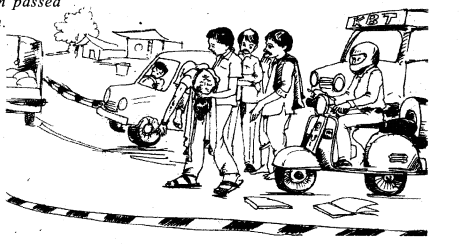
Baleshwar took the mobile from the truck driver and informed Dinesh. When Dinesh Talreja was closing the days business, he got the call and agree to come immediately. He had marketing job at a retail shop in Ulhasnagar. Roma was admitted to Divine Multispeciality Hospital and Research Centre. Dr. Anil Agarwal, the medical director, seeing the condition of Roma admitted immediately to the ICU without any paper work or formalities. He asked Baleshwar to wait until Roma’s family arrived. After this, Baleshwar noticed that he couldn’t thank the truck driver because the driver already left the place. Roma s X-rays showed that she needed only deep wounds sutures although the injuries looked severe.
There would be no lasting damages. Dr. Agarwal s opinion was that she could have bled to death if nobody helped her. Baleshwar had brought her to the hospital at the right time. Baleshwar came to meet her next morning she was still partly sedated. Dinesh told him that Roma s cell phone and handbag were missing. So Baleshwar went to the spot and was looking for her belongings. A railway employee informed that some of Roma s belongings had been found. Roma made full recovery in a few days. She was thinking about the accident and said that she could n’t imagine what would have happened if Baleshwar hadn’t been there. She was (amazed) surprised to learn of the manner in which she had been rescued.
Really she was astonished that a stranger would jump off from the train and risk his life for her. She thought that-she could, never repay Baleshwar This is the real compassion and it is a great virtue. Without any expectation, Bcdeshwar did this. According to’ Baleshwar Mumbai people are afraid to help because they had the fear of getting trapped in the courts or police; If anybody asked him why he had done that, he simply said that she needed help, that day it was Roma, tomorrow it could be some other like you or me. Helping is necessary for those who needed, especially timely help will save the life. Here author’s intention is to love everybody, help the needful, that is the great virtue. It changes the world and it becomes paradise and man becomes divine.
There’s a Girl by the Tracks! Summanry in Kannada
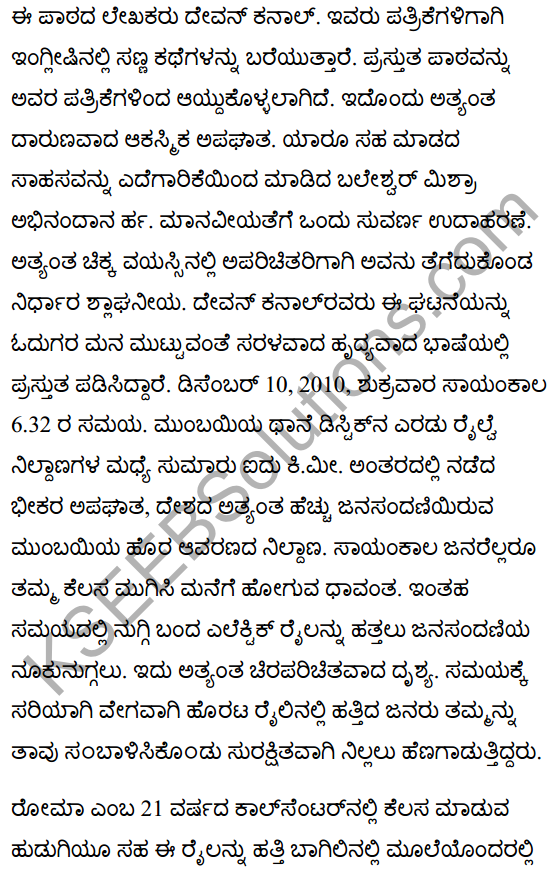
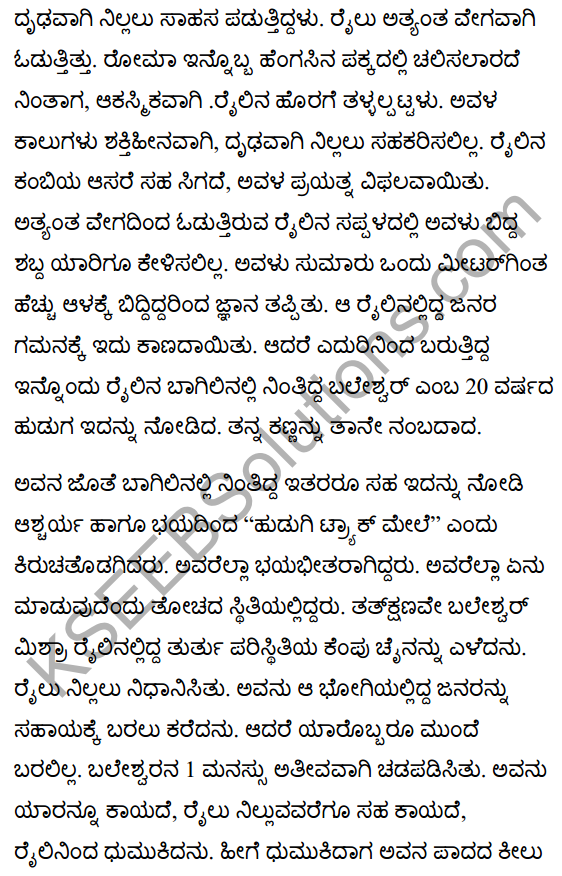
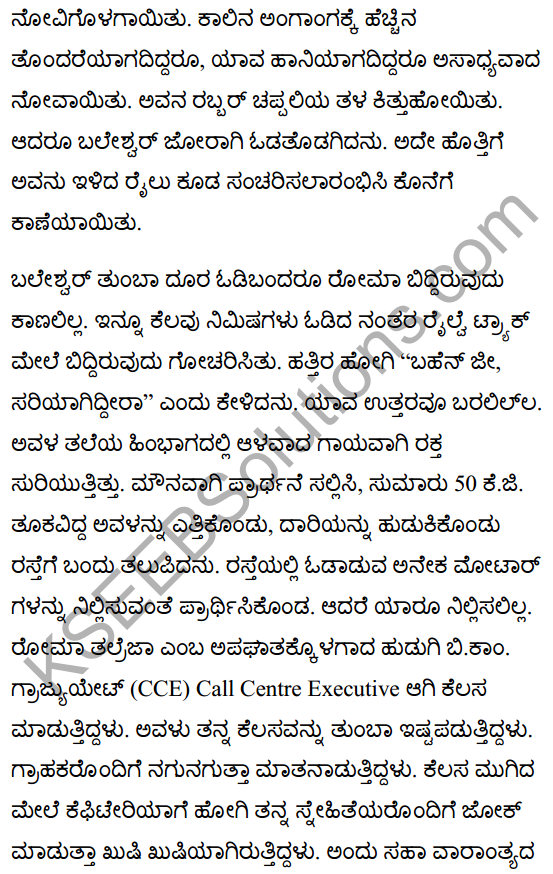
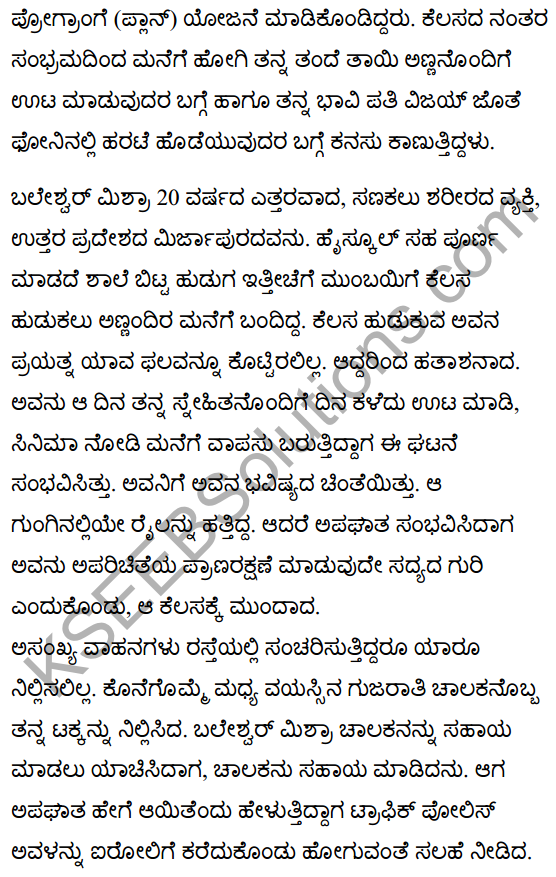
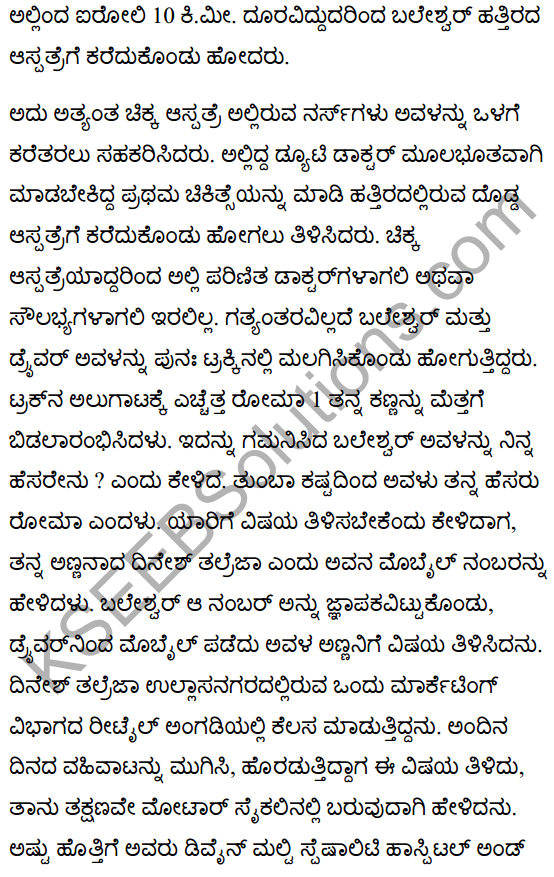
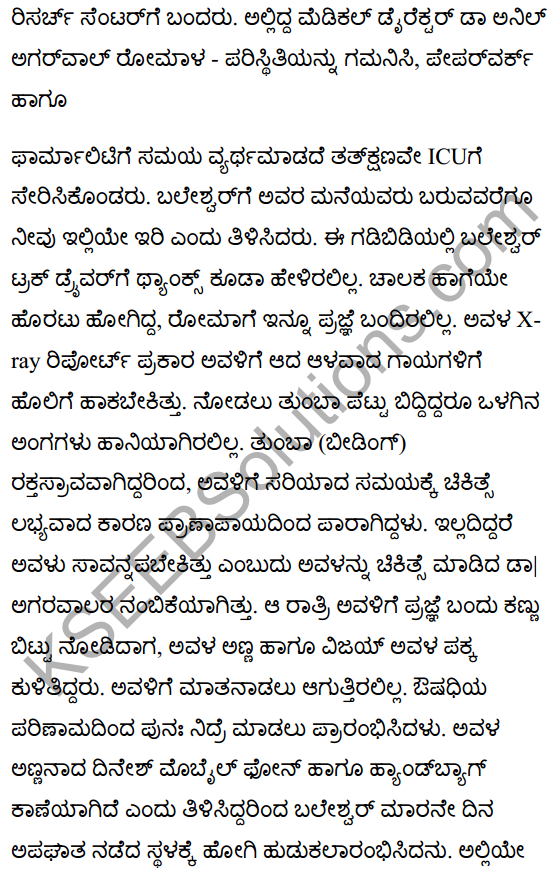
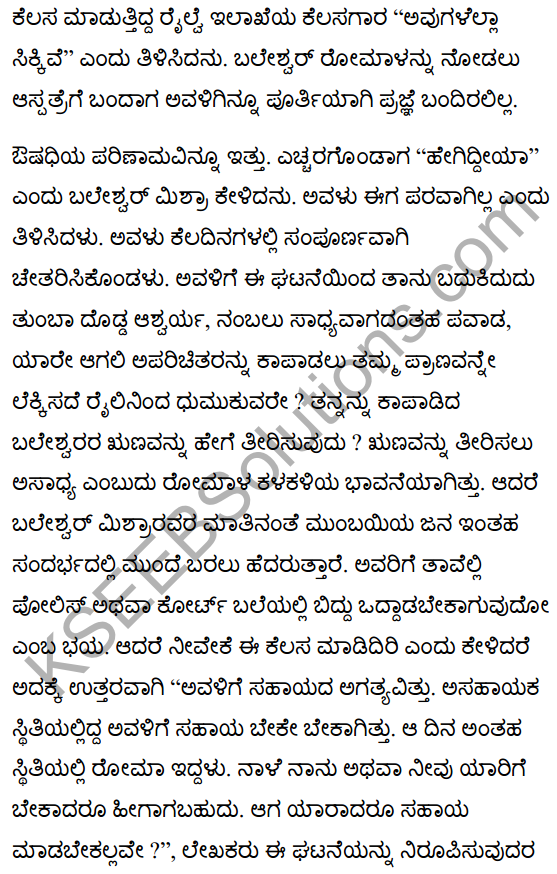

Hope all the information given regarding Karnataka Class 10 English Solutions Prose Chapter 2 There’s a Girl by the Tracks! will help you to get good knowledge. For any queries, you can contact us and clear your doubts. Connect with us using the comment section. Also, we love your feedback and review. Get your Chapter Wise Karnataka Secondary Education Examination Board Class 10 Textbook Solutions for English PDF start learning for the exam.

